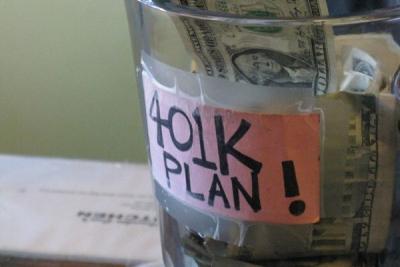
 cross-posted from Shareable
cross-posted from Shareable
I'm almost 40 and my retirement savings is so small, it's barely worth mentioning.
Then again, that's why I'm mentioning it. My retirement savings may be small, but I plan to make it powerful. By this time next year, I'll have a checkbook and a debit card that will give me the power to invest my $10,000 401(k) in my own community. Plus, I'm hoping to find 500 or more friends to do the same (more on that below and on an April 11 webinar). Together, we could unleash millions of dollars of capital into enterprises and organizations benefiting our own communities. I probably won't withdraw my retirement savings until 2040, by which time our 2030 deadline for reversing climate change will have come and gone. That's why I want my retirement savings to stay busy, in the meantime, nourishing the planet and communities where I plan to retire. For example, I plan to invest in People Power Solar Cooperative and California FarmLink, which are currently taking investments to scale up community solar and farmland access, and there are so many more investments that can bolster climate solutions.
Here's some background and how you can explore options for your own nest "next" egg. My organization, the Sustainable Economies Law Center, has spent over nine years advocating for and carving out legal channels that enable people to invest their money into their communities. With the advent of crowd-financing, there are now many opportunities to make direct investments in small and local enterprises. Retirement savings have trillions in untapped potential for such investments. In brief, here are some options for tapping it:
One option is self-directed individual retirement accounts (SD IRAs), which you can create by moving or creating your IRA with a custodian company that will write checks and manage investments according to your instructions. A few years ago, Slow Money of Northern California did a comparison of custodians used by their members, who are individuals channeling their investments toward sustainable food systems. My experience with SD IRAs comes from providing legal support to organizations raising financing from SD IRAs. For example, to acquire 10 acres of land in 2012, Wild & Radish and Planting Justice received five loans, totaling $90,000, from the SD IRAs of their fans and supporters. Anecdotally, from that experience and from individuals I know with SD IRAs, the biggest complaints I hear are about the administrative and cost burdens: Some custodians require a lot of paperwork and their fees can mount up. A lot of people would rather have the power to write investment checks themselves, which leads us to 401(k)s.
401(k) are retirement savings plans managed by self-employed individuals or by employers. Generally, anyone with self-employment income (that’s about 30-40% of people in the U.S.) can create and have checkbook power over what's called a solo 401(k). You first need to find a provider, which is a company that drafts the language of plan documents and gets the documents approved by the IRS (there aren't many providers, but some we know of include IRA Financial Group, My Solo 401k Financial, Sense Financial, Broad Financial, Discount Solo 401k, AccuPlan, Nabers, and Revzon). Last year, the Sustainable Economies Law Center helped someone set up a solo 401(k). Sense Financial got her set up for an $800 fee. She created a local credit union account in the name of her 401(k), deposited $5,000, and now invests it using a special debit card and checkbook. She even has the option to roll her existing IRA into the solo 401(k). There's a lot more to say about the rules governing solo 401(k)s, but in a nutshell, although it's limited to self-employed people, it may be the simplest way to gain complete control over your retirement savings.
This leaves us with the question: Can employees gain the power to direct their employer-sponsored 401(k) toward specific investments? The answer, in theory, is yes, though I don't yet have a good example. My friends at the worker cooperative LIFT Economy are in conversation with providers about creating a 401(k) plan that makes one or more members of their team the trustee and administrator of the plan, making investments based on the team’s collective decision-making.
If you'd like to learn more about that and about the nuts & bolts of SD IRAs and solo 401(k)s, join us for a webinar on April 11, 2019 at 11:30 am (Pacific), presented by author Michael Shuman and co-sponsored by LIFT Economy, Sustainable Economies Law Center, and Shareable. On that webinar, you'll also learn about how Michael, LIFT, and the Law Center are planning to bring together more resources on this topic and organize more people to use solo 401(k)s.
That's where our 500 friends come in: If we find a lot of people interested in starting solo 401(k)s by the end of this year, we can build significant bargaining power with plan providers. We already have providers that have expressed the intention of giving discounts if we can bring them business. For example, we'd say: "Hey, would you cut your fees in half if we bring you hundreds of customers?" And imagine if hundreds of organized people were ready to write checks from their retirement savings by 2020. That's a powerful force for our local economies! If you are interested in being one of those 500+ friends, go ahead and share your information with us here.

Add new comment